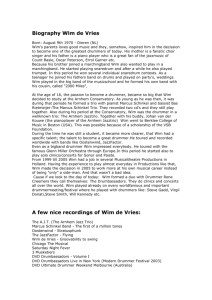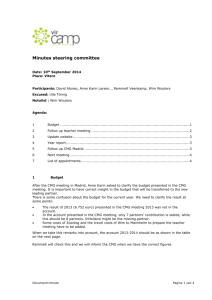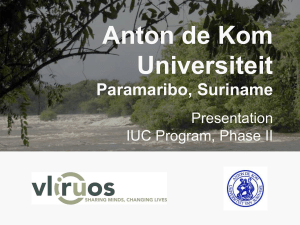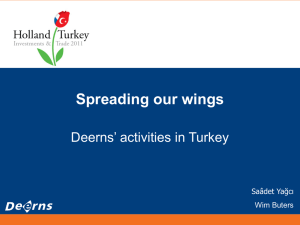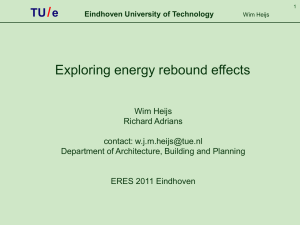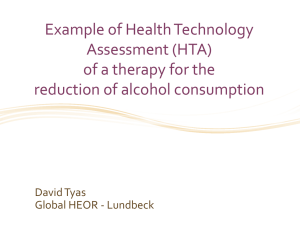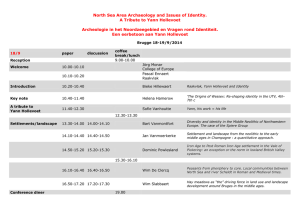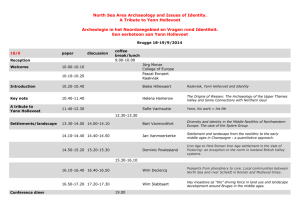here - Wine in Moderation
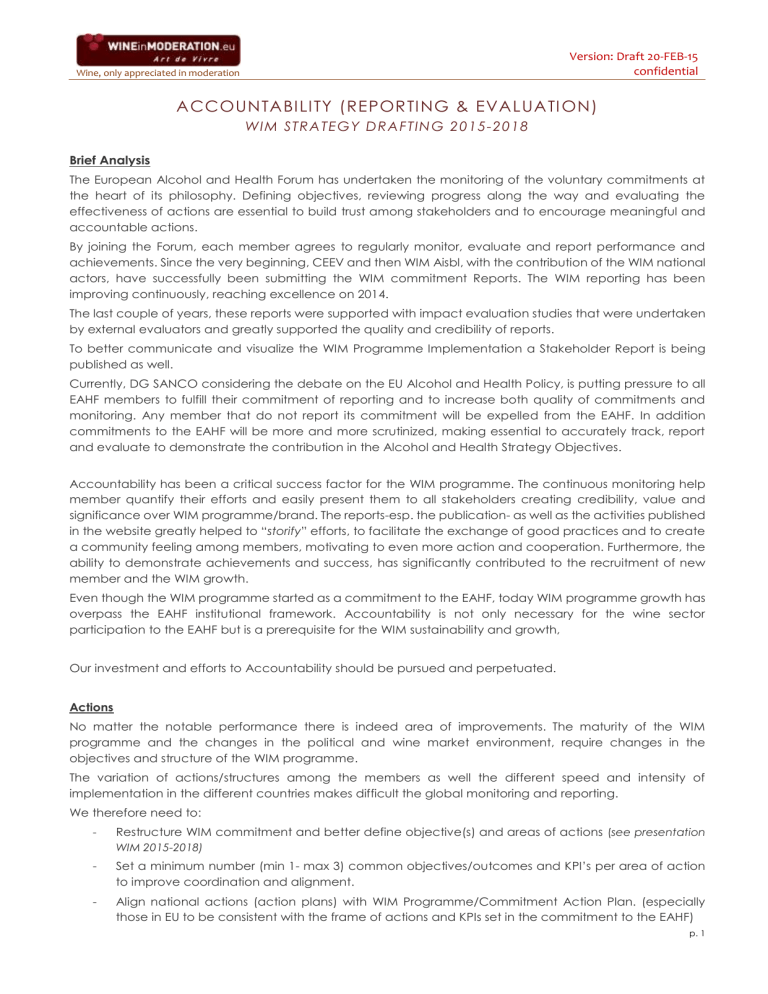
Wine, only appreciated in moderation
Version: Draft 20-FEB-15 confidential
ACCOUNTABILITY (REPORTING & EVALUATION)
WIM STRATEGY DRAFTING 2015-2018
Brief Analysis
The European Alcohol and Health Forum has undertaken the monitoring of the voluntary commitments at the heart of its philosophy. Defining objectives, reviewing progress along the way and evaluating the effectiveness of actions are essential to build trust among stakeholders and to encourage meaningful and accountable actions.
By joining the Forum, each member agrees to regularly monitor, evaluate and report performance and achievements. Since the very beginning, CEEV and then WIM Aisbl, with the contribution of the WIM national actors, have successfully been submitting the WIM commitment Reports. The WIM reporting has been improving continuously, reaching excellence on 2014.
The last couple of years, these reports were supported with impact evaluation studies that were undertaken by external evaluators and greatly supported the quality and credibility of reports.
To better communicate and visualize the WIM Programme Implementation a Stakeholder Report is being published as well.
Currently, DG SANCO considering the debate on the EU Alcohol and Health Policy, is putting pressure to all
EAHF members to fulfill their commitment of reporting and to increase both quality of commitments and monitoring. Any member that do not report its commitment will be expelled from the EAHF. In addition commitments to the EAHF will be more and more scrutinized, making essential to accurately track, report and evaluate to demonstrate the contribution in the Alcohol and Health Strategy Objectives.
Accountability has been a critical success factor for the WIM programme. The continuous monitoring help member quantify their efforts and easily present them to all stakeholders creating credibility, value and significance over WIM programme/brand. The reports-esp. the publication- as well as the activities published in the website greatly helped to “storify” efforts, to facilitate the exchange of good practices and to create a community feeling among members, motivating to even more action and cooperation. Furthermore, the ability to demonstrate achievements and success, has significantly contributed to the recruitment of new member and the WIM growth.
Even though the WIM programme started as a commitment to the EAHF, today WIM programme growth has overpass the EAHF institutional framework. Accountability is not only necessary for the wine sector participation to the EAHF but is a prerequisite for the WIM sustainability and growth,
Our investment and efforts to Accountability should be pursued and perpetuated.
Actions
No matter the notable performance there is indeed area of improvements. The maturity of the WIM programme and the changes in the political and wine market environment, require changes in the objectives and structure of the WIM programme.
The variation of actions/structures among the members as well the different speed and intensity of implementation in the different countries makes difficult the global monitoring and reporting.
We therefore need to:
Restructure WIM commitment and better define objective(s) and areas of actions (see presentation
WIM 2015-2018)
Set a minimum number (min 1- max 3) common objectives/outcomes and KPI’s per area of action to improve coordination and alignment.
Align national actions (action plans) with WIM Programme/Commitment Action Plan. (especially those in EU to be consistent with the frame of actions and KPIs set in the commitment to the EAHF) p. 1
Wine, only appreciated in moderation
Version: Draft 20-FEB-15 confidential
Identify, WIM on-going or future projects by any of the WIM actors that are qualified to stand as unique commitments to the EAHF and submitted them as individuals commitments linked/associated with the main WIM Commitment/ programme. This will reveal WIM good practices that are hard to be communicate due to the current structure of the WIM commitment and the EAHF.
Improve monitoring reporting tools with the online tools (e.g. such as Pernod Ricard’s “Smart
Barometer” tool) to facilitate reporting and performance presentation.
Define tangible short/medium/long term outcomes and set procedure/actions to evaluate impact.
The outcomes could consider regarding the main WIM objective ( inform, educate, raise awareness and safeguard appropriate patterns ) and/or the specific objectives per area of action. (e.g. on VET, or self-regulation)
(e.g. Measure the change of knowledge/awareness on responsible drinking and risk associate with harmful alcohol consumption, the change of WIM equity significance , change of consumption behaviour in relation to the WIM significance change).
Accountability Investment
For the Accountability all WIM actors-especially WIM aisbl & WIM members-have to invest both financial and human resources.
The human resources cost are the WIM actors employees’ time dedicated to monitoring, measuring and reporting the KPI’s per year.
The financial investment is required for the development of the online tool (~8.000€), the 3 rd body impact evaluation (from 25.000€ – 50.000€/year) and the publication/dissemination of reports (~8.000€/year).
Impact evaluation
The 3 rd body impact evaluation impact evaluation is the higher cost. (Internal evaluation could be considered for the reduction of the cost but it will always lack the credibility of a 3 rd independent organization.)
Depending on the available budget and WIM objectives, the evaluation procedure could be one or several from the following options:
1.
Omni-bus survey (e.g. Wine Intelligence Vinitrack)
2.
Focus-group
3.
Specific surveys for the different areas of action by third bodies
To reduce the cost we could consider one or several of the following options:
1.
Include the questions about WIM evaluation in ongoing national wine surveys supported or undertaken by WIM actors
2.
WIM members/actors to consider the opportunity of adding to the WIM omnibus additional questions about their market topics and finance the omnibus
3.
Split the cost between national WIM actors and WIM aisbl.
4.
Limit the survey to only a representative sample of countries
5.
Reduce the number of questions
6.
An evaluation study as part of the DG Agri Promotion of Farm Product Programme which in the case of a multi-country programme on responsible drinking can reach 80% of co-funding by EC requires. p. 2


